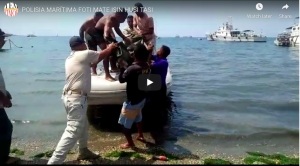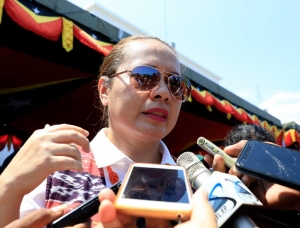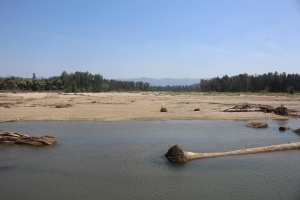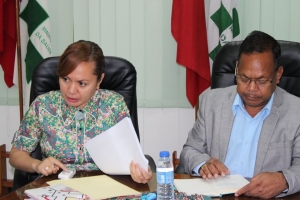Items filtered by date: Sunday, 01 December 2019
Polisia Marítima Foti Mate Isin husi Tasi
https://www.youtube.com/watch?v=fEDzZhHR6cg
Nina nu’udar sobrevivente ida husi Masacre Santa Cruz, iha 12/11/1991 hetan mout iha tasi besik Palasiu do Governu nia oin iha loron Domingo (01/12).
Vitima mout iha tasi nee PNTL parte Marítima nian konsege foti sai maibe lakon Ona nia moris.
Nina, ne’ebe nia naran kompletu Marcelina Ximenes ne’e sofre moras lakon hanoin no iha fulan ruma liu ba kotuk hetan baku husi estudantes balun.
Tuir obsevasaun ESTADU Timor Leste seidauk tau atensaun ruma ba ema moras mental sira nunee lao mesmesak iha liuron ninin sidade kapital nasaun nian.
Moras iha MS (parte 3), Desizaun Elia no Krize Boot iha Aprovizionamentu MS
Tempotimor (DILI)-Desizaun Ministra Saúde Interina Elia dos Santos Reis Amaral hodi hasai Diretór Aprovizionamentu Ministériu Saúde Agapito da Costa la’os de’it hamosu deskonfiansa, maibé mós hamosu krize boot ida iha aprovizionamentu ministériu ne’ebé daudauk ne’e Elia lidera hela.
Timor-Leste suffers climate change
Tempo Timor (Dili) - Timor-Leste is experiencing climate change, says Demétrio de Amaral de Carvalho, secretary of state for the environment. The weather is more extreme. The northern part of the nation is suffering from drought, while the south is experiencing more rain and flooding. The country is however not well equipped to deal with these growing problems.
Scientists expect the temperatures in Timor-Leste to rise with 0.3 to 1.2 degrees Celsius by 2030. ‘Already drought is affecting farmers who see their harvest failing. If they produce little there is not enough food, which leads to malnutrition. Also the farmers will have less income, thus the drought contributes to poverty,’ says De Amaral de Carvalho.
In recent months huge bushfires in Liquica and Ermera have destroyed large coffee plantations which resulted in loss of trees, crops and vegetation, the death of animals, the degradation of environment and houses going up in flames. The financial loss of these fires alone is estimated at 22 million US dollars.
The sea-level will rise with approximately 1.3 to 2.3 millimetre per year. Not only will Timor-Leste’s lower coastal areas be affected by erosion, but underground sweet water sources will become salty, creating water problems and degradation of the soil. Flooding in the rainy season destroys the infrastructure disrupting daily life and the economy. ‘What you see is that the impact from one event to the other is interconnected,’ says the state secretary.
Prone to disaster
Timor-Leste is ranking ninth on the list of countries that are prone to natural disaster, says the state secretary, referring to UN experts. ‘But our mechanisms to cope with disaster didn’t have much opportunity’ to develop, states De Amaral de Carvalho.
Timor-Leste became independent 20 years ago, after having been occupied, destroyed and robbed of natural resources by Indonesia. ‘We had to develop the country almost from ground zero,’ the state secretary says, explaining that infrastructure, schools and health care had to be built up from scratch. ‘But this can’t be an argument that we can’t take action to protect our people from climate change,’ states De Amaral de Carvalho.
Measures
The state secretary stresses that Timor-Leste needs to take its responsibility with regard to climate change. The government has taken several measures such as the allocation of more money to the state budget. The prime minister is in charge of the national council for disaster management. ‘But sometimes the environment is still seen as [an issue] that has less priority,’ the state secretary admits.
To protect the capital city Dili against the sea along the coast from the port to Kampung Alor, the government ‘invested millions to develop infrastructures’, says the state secretary. But more needs to be done to prevent coastal towns and villages from being in danger. The state secretary says ‘biological engineering’ is one of the solutions to mitigate the degradation of the coastal areas. Timor-Leste needs to plant more mangrove and conserve vegetation that is able to retain sand.
Rich countries
Climate change is a global problem. The industrialised countries are the main source of green gas emissions that cause climate change, while a country like Timor-Leste’s part is extremely small (its emissions are just 0,003 percent of the world’s total), but suffers the consequences of the huge footprint of the big economies. State secretary De Amaral de Carvalho says the big polluters need to help. ‘It’s a moral responsibility. These rich countries already contributed to the degradation of this planet. They should share their resources to help the poor nations to be able to participate in conserving and protecting this planet,’ says the state secretary.
One area where Timor-Leste is seeking help is with prevention of disaster and minimize the risks. It is important to have early warning systems, but Timor-Leste doesn’t have this expensive technology. Therefore the government seeks cooperation with countries that do have the technology and systems.
But of the 100 billion dollar the developed countries promised during the Paris Climate Change Conference in November 2015 to assist developing countries with mitigation and adaptation to climate change, only 10 billion has been provided. From 2 – 13 December the UN Climate Change Conference will take place in Spain.
Solutions
The state secretary admits that also more climate education is needed ‘to increase the knowledge about these issues among the wider population’ in Timor-Leste. Climate change is not an easy subject. ‘You tell people that they should not cut trees. But they need the wood for cooking. They need cash for their daily needs. We need to manage this. Not only to protect the environment, but we also have to think of people as centre for conservation,’ he says.
One solution is for Timor-Leste to make money with sustainable development of natural resources. ‘We think of integrated forest rehabilitation program with carbon credits,’ the state secretary explains. Under an international scheme Timorese farmers will be paid for planting trees, which absorb greenhouse emissions and improve the environment.
While Timor-Leste has gas and oil as its main resources, the country also has huge biological resources, says the state secretary. Sandalwood for instance sells at high prices and there are other species as well with promising prospects. These natural products can generate income ‘in a sustainable way for present and future generations,’ says De Amaral de Carvalho.
Moras iha MS (parte 2) “Funu” Despaisu MS Interinu, Kada Fulan 6 Troka Komisaun Avaliasaun ba Projetu
Tempotimor (Dili)-Politika Governu Aliansa Mudansa ba Progresu (AMP) hodi priense kadeira Ministru ne’ebé mamuk ho kargu Ministru Interinu ka asesor prinsipal karik konsege hamenus problema implementasaun programa iha ministériu balun, maibé iha Ministériu Saúde (MS) politika ne’e hanesan sai fali oportunidade atu hatudu poder ba malu.
in English
Popular
Error: No articles to display
.













